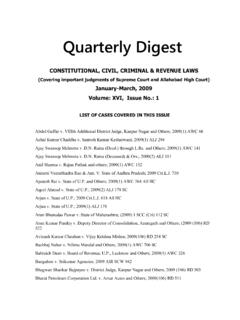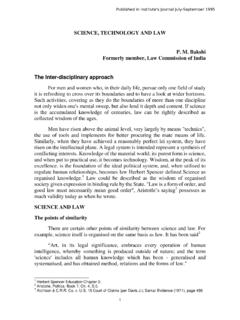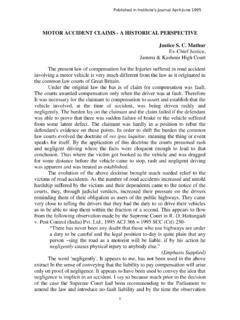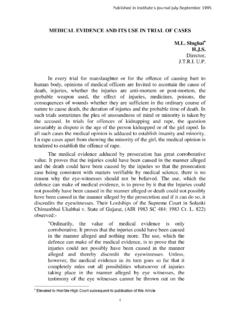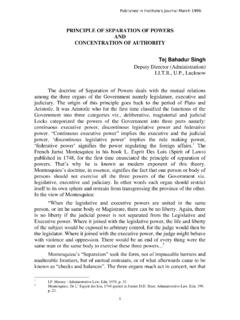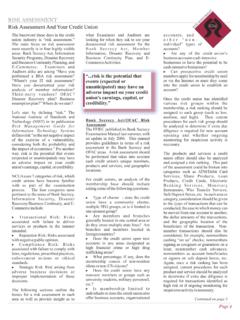Transcription of LAW OF INJUNCTIONS Justice R. R. K. Trivedi Judge ...
1 1 LAW OF INJUNCTIONS Justice R. R. K. Trivedi Judge , allahabad high court The law of injunction in India has its origin in the Equity Jurisprudence of England from which we have inherited the present administration of law. England too in its turn borrowed it from the Roman Law wherein it was known as Interdict. The Roman Interdicts were divided in three parts, prohibitory, restitutory and exhibitory. The prohibitory Interdict corresponds to injunction . The injunction as a chancery remedy developed at the time of Henry, the Vlth. The Chancellor set aside a certain bond by the plaintiff as one not binding on him. The court of Common Pleas, however, gave a decree with bond. Chancellor thereupon devised the remedy of injunction by which he prohibited execution of the decree of Common Law court . This exercise of power by issuing injunction by the Chancery court was viewed with jealousy by the Common Law court and it became a source of conflict between the two jurisdictions.
2 This conflict rose to the climax between the Lord Justice Coke and Lord Chancellor Ellesmere in 1816. A decree was obtained from Lord Coke by practising gross fraud. The Chancellor thereupon by an injunction perpetually enjoined the decree-holder from proceeding to execute his judgment. The validity of this procedure of issuing injunction was seriously questioned. The matter was referred to Bacon, the then Attorney General and other counsel, who finally settled the question in favour of Chancellor. The jurisdiction to issue INJUNCTIONS was thus affirmed and the remedy which is termed as the strong arm of the Courts of equity has contributed a lot to consolidate the position of the judiciary in dispensing Justice between the litigant parties. From the aforesaid historical background it is manifest that the origin of the power to grant injunction is from equity, hence the exercise of the discretion by the Courts is to be governed mainly by equitable considerations.
3 In our country in Criminal matters Sections 133, 142 and 144 of the Code of Criminal Procedure deal with grant of injunction . In Civil matters the law relating to grant of injunction is contained in Chapter VII of Part III of the Specific Relief Act, 1963. Sections 36 to 42 deal with the grant of injunction . It has been termed as a prever1tive relief which is granted at the discretion of the court by injunction which may be temporary or perpetual. Section 37(1) of the Specific Relief Act, 1963 deals with the temporary INJUNCTIONS which are such as are to continue until a specified time, or until further orders of the court , and they may be granted at any stage of the suit or proceedings and are regulated by the Code of Civil Procedure. From the aforesaid it is clear that there can be permanent injunction which is granted as a final relief in the suit and there can be temporary injunction which may be passed at any situation of the suit or proceedings for preservation of the property.
4 Both have to be discussed separately. Permanent injunction : As is clear from Section 37 (2) of Specific Relief Act, 1963 (hereinafter referred to as the Act), a perpetual injunction can only be granted by the decree made at the hearing and upon the merit of the suit. The defendant is thereby perpetually enjoined from the assertion of a right or from the commission of an - act which would be contrary to the right of the plaintiff. Section 38 of the Act further provides the circumstances where the perpetual injunction may be granted in favour of the plaintiff to prevent the breach of an obligation 4 YFPMWLIH MR -RWXMXYXI W .SYVREP 1 EVGL 2 existing in his favour, whether expressly or by implication. In contractual matters when such obligation arises, the court has to seek guidance by the rules and provisions contained in Chapter II of the Act dealing with specific performance of contracts.
5 Sub- Section (3) of Section 38 in clauses (a), (b), (c) and (d) further illustrates the circumstances where a perpetual injunction may be granted by the court . The mandatory INJUNCTIONS are contemplated under Section 39 of the Act where it is necessary to prevent the breach of an obligation and the erring party may be compelled to perform certain acts. Section 40 provides for granting damages in lieu of or in addition to injunction . Section 41 provides circumstances where the injunction should be refused. Section 42 provides for grant of injunction to perform a negative agreement. It was made clear at the beginning that the Law of injunction is vast and expansive jurisdiction and It forcefully illustrates the power of equity in spite of the fetters of codification to march with the times and adjust the beneficial remedies to altered social conditions and the progressive needs of the humanity.
6 The first Specific Relief Act was codified in the year 1877 which was replaced by the Specific Relief Act of 1963 (Act of 1963). In spite of the codification the law of injunction continued to expand and it fulfilled the needs of the society in different shapes - and forms. The codification of the law has never proved a fetter. In this context, a Civil court should never have any hesitation in granting injunction to new circumstances and situations. Our society is a progressive society, our country is a developing country and with the growth of the industry one may be called upon to administer law of injunction to various kinds of new situations which were wholly unknown to this field earlier. The essential test should, however, remain equity. In this context the views expressed by the Courts and Jurists may be gainfully quoted here : "It is the duty of a court of Equity," said Lord Cot ten hem in Taylor v.
7 Selmon, (and the same is true of all Courts and institutions), "to adopt its practice and course of proceedings, as far as possible, to the existing state of society and to apply its jurisdiction to all those new cases which from the progress daily made in the affairs of men must continually arise and not from too strict an adherence to forms and rules established under very different circumstances decline to administer Justice and to enforce rights for which there is no other remedy." Similarly, the view expressed by the great jurist Shri Banerjee in Tagore Law Lectures as far back as in 1906 may be remembered by us as a good guide even today in this field of law. Banerjee said: Since an obligation includes every duty enforceable by law this form of specific relief, it would appear, is applicable to all cases where one person can enforce a duty against another, or to use the correlative term, where one person is vested with a right which empowers him to constrain the other to adopt a particular line of conduct, or to do or abstain from doing a particular act.
8 This right mayor may not arise out of a contract, and the remedy of injunction , by which preventive relief is granted by a court , may be held to be available throughout the whole range of the law, But the jurisdiction is carefully defined in part Ill, Specific Relief Act, and to some extent circumscribed. It still remains, however, a vast and expansive jurisdiction, and forcibly illustrates the power of equity, in spite of the fetters of codification, to march with the times and adjust the beneficial remedies to altered social conditions and the progressive needs of humanity.' Mr. Joyce also in his Law of INJUNCTIONS has expressed identical views. He says, As a remedy for preventing wrongs and preserving rights, the injunction has been regarded as more flexible and adjustable to circumstances than any other process known to law.
9 The correctness of the estimate is seen in the readiness with which INJUNCTIONS yield to the convenience of the parties, the case with which damages are substituted in their place when Justice and public interest so require, the facility with which a preventive and a mandatory 3 injunction are made to co-operate so that by single exercise of equitable power an injury is both restrained and repaired, and the facility with which injunctive relief can be applied to new conditions and adjusted to the changing emergencies of modern enterprise. In this connection it may be declared that as writ of injunction my be said to be a process capable of more modification than any other in the law, it is so malleable that it may be moulded to suit the various circumstances and occasions presented to a court of Equity.
10 It is an instrument in its hands capable of various applications for the purpose of dispensing complete Justice between the parties. It may be special, preliminary, temporary or contracted, in short it is adopted, and is used by Courts of Equity, as a process for preventing wrong between, and preserving the rights of parties in controversy between , where, too, if a party cannot at once comply with an injunction without being put to great expense or grievous annoyance, the court may order that the injunction do not commence until after a certain stated period. injunction should not be denied on the ground of its novelty in application, if the exigencies of the situation required it and if it does not militate against statutory provision. The Courts should act according to Justice , equity and good conscience, when there is no specific rule applicable to the circumstance of the case.
